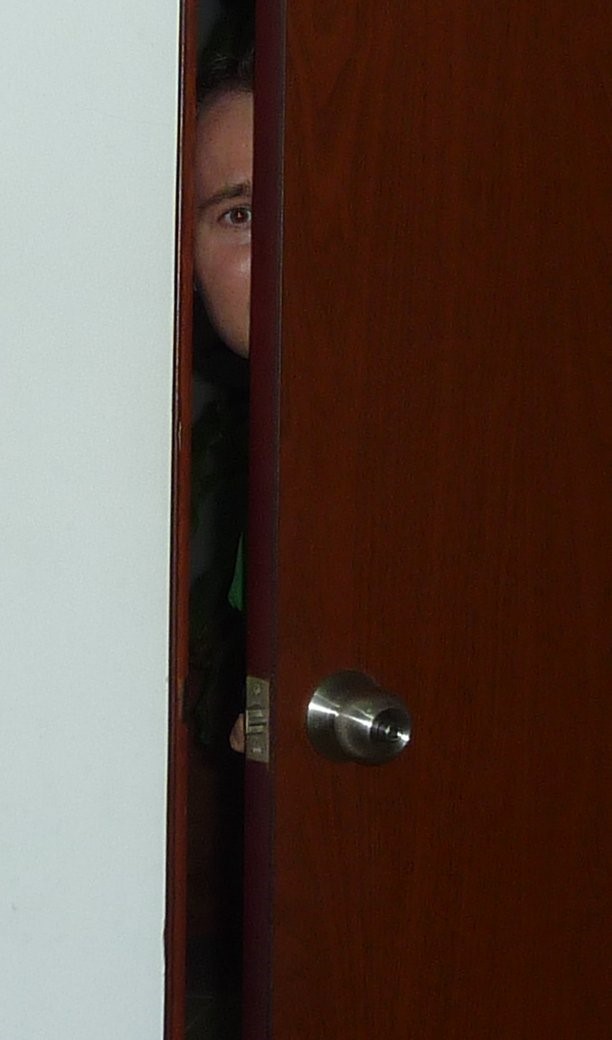The Shy “Delusion”: Stop Being Shy and Just Start Speaking!
This is another post that is going to ruffle some feathers, but it has to be said.
Unless you suffer from a social anxiety disorder or experience severe, constant shyness, YOU ARE NOT SHY. Stop describing yourself as such.
If you do suffer from severe shyness or social anxiety, then this blog post is not aimed at you. So please don’t feel that I’m attacking you. This post is for the majority of the population, who think they’re shy but in reality aren’t any more shy than the rest of us.
How can I be so bold as to claim that the majority of the population is not actually shy? Well, because everyone says they are shy. Sound contradictory?
When pretty much everyone says it, the meaning of the word gets watered down to nothing. (Which in turn does a disservice to those of you who truly are at the extreme end of the shyness scale.)
People's tendency to identify with shyness and/or introversion comes from something similar to the Forer effect, where a vague personality description is identified as “very accurate” by the large majority. It's the basis of the entire astrology industry: sell people a generic description that sounds accurate “only” about them and they'll buy it.
The original test run by Forer, and repeated by many others like Derren Brown (click to see the video) had the following or similar text (among other suggestions) that almost everyone gave a 5 out of 5 rating for accuracy:
“At times you are extroverted, affable, sociable, while at other times you are introverted, wary, reserved.”
Besides heaps of scientific research to show how almost everyone would rate this description as spot on, my own experience in talking to people confirms that they will produce the same generic description of themselves when I meet them. This makes it totally meaningless and they may as well burp in terms of telling me anything about themselves.
The “Total Extrovert” You’re Comparing Yourself to Doesn’t Actually Exist

It would seem that in our own heads we have a typical idea of what a complete extrovert is – the “life of the party” guy/gal who strolls in and confidently talks to everyone and who everyone loves. They never doubt themselves and don't ever have moments where they too would retreat into their head or feel that they just don't want to be social at times.
This mythical creature doesn't exist (unless they have undergone some intensive social de-programming). I have met many people who are the stereotypical social party animal and you know what? They identify with the exact same Forer description as above. Party animals tell me how shy they are and compare themselves to even higher-level party animals who would likely do exactly the same thing.
Everyone doubts themselves and everyone is “shy” in a situation they are not comfortable with. If everyone is shy, it means nothing. It would be like saying “everyone is short”.
People's ability to judge their own level of introversion/shyness is horrible. They use an exaggerated basis of comparison, not realising that the rest of the planet is doing precisely the same thing. If we were to all compare ourselves to Michael Jordan, then of course “everybody” would be short. Using the extreme as the basis of comparison, rather than a middle average, is worthless.
“I Don’t Like Shallow Conversations and Need Some Me-Time”
Do you feel more comfortable in certain situations and much prefer to talk to people about particular topics? Do you prefer to have some time alone to do your own thing? Are you uncomfortable in unfamiliar surroundings and sometimes worry about what people might think of you? Do you prefer quality and depth rather than quantity and shallowness of conversations?
Do you also breath air and drink water? Congratulations – you're just like everyone else.
This post was inspired by a topic on extroverts vs introverts on the How to Learn Any Language forum, and I found it frustrating to see how many generic attributes (as listed above) people used to describe themselves as an introvert. Introversion and shyness are different (a ‘shy' person may actually desperately want to be social, whereas an introvert takes more pleasure out of non-social interactions than extroverts would), but because the end result of less socialising is more-or-less the same they have a lot in common.
You May be Genuinely Shy or Introverted (and that’s OK)…But More Likely, You’re an ‘Ambivert’
Of course, I'm not saying that the entire concept of shy vs extroverted is in our heads. There are people that truly do get more energy out of social interactions than others, even if occasionally superficial, and those that prefer to be on their own most of the day. There are also some on the autism spectrum who really cannot participate easily in social interactions.
This is totally fine. I completely acknowledge that some people do fit squarely at one extreme or the other (either very shy/non-social or very outgoing).
The problem is that most people identify with the extreme end of introvert/shy even though they’re actually in the middle – “ambiverts” if you will – and yet label themselves as introverts or shy.
To summarise: if you sometimes feel shy, introverted or unsociable, and sometimes feel at home socialising in a group, then don’t define yourself as “shy”; that’s not shy, it’s just normal. Rigidly defining yourself as shy is not only inaccurate but can even have negative consequences…
How a Definition Can Define You
So what's the big deal? Why am I bringing this up at all?
It's because identifying with this definition of yourself (which is not what is actually unique about you, if almost everyone else claims it too) will predetermine what your limitations are. When you are sure that you are shy or an introvert, then whether it's true or not, it will become true.
It's a self-fulfilling prophecy.
Why can't you walk up to that stranger and say hi? “Because I'm shy,” you answer. So you don’t do it. You don’t even try. This identification with being shy is stopping you and limiting you. Some people have legitimate reasons for not wanting to trust strangers, and that's fine, but “I'm shy” as an excuse only serves to paint yourself into a corner. Now you can't talk to that stranger because you have decided that you’ll always be too shy to do it.
How can I so arrogantly presume how many people's minds work? Because I used to identify with shyness. I thought it was an inherent part of my being and personality – encoded into my genes. Or perhaps going to an all-boys Catholic school followed by studying an intensive technical subject and not socialising much sculpted me into an introvert who preferred the company of books and TV to people.
And you know what I've realised over the last many years on the road? If I had to give you one piece of advice to gain confidence in socialising with more people, it would be to stop trying so hard to convince yourself that you’re “too shy”.
Once you realize that sticking to the conviction that you’re shy is imposing false limitations on yourself, you’ll be in a position to do something about it. You can stop being scared to meet new people. You can stop thinking about all the things that can go wrong if you talk to someone, and stop reminding yourself how shy you are. You can just go right up and speak to them!
I'm not saying introversion is “wrong”. There are things that people who spend all their time with others can't appreciate about self-reflection, focused studying and even just down time to be quiet. But the reverse is also true: there is a movement of proud introverts who snub social people as superficial, and I find this arrogant and blanket judgement nothing less than hypocritical.
There is only so much you can learn from books and from going into your own head. Sometimes you just need to spend time with others and can't learn more about what you want – in my case, speaking a language fluently – without doing this.
I’ve now learned to embrace my extrovert side (while still being OK with feeling unsociable sometimes, since I no longer let that side of me define me as a whole). And yes, I do want to convert more people to being confident and social more often. Why? Because it’s so wonderful to see what people are capable of when they reach their full social potential.
Reaching Your Social Potential isn’t as Hard as You Think
When I'm out with a “shy” person, I make a point to see who they'd like to talk to and push them (sometimes literally) into that group. They never regret it. I met a shy girl in Berlin and showed her my “amazing” glass clink trick. She talked to me for several minutes about how shy she was and so I grabbed her glass as she held it, walked her up to someone she wanted to talk to, clinked it and ran away before he had time to see me. I gave her an initial boost, (which technically was just moving her arm muscles for her – no words needed) but the rest of the night she tried it and made many many friends.
It was that easy. I'm writing about this so confidently because I have done this so many times. I have made shy people very social by action rather than psychologically analysing them.
When someone says “I'm shy” to me, what I actually hear is “I just need a tiny nudge and then I can be as social as you”.
Speak, for Heaven's Sake!
The reason this point frustrates me so much is because it comes up repeatedly in a language learning context, especially since my advice is so communicative and relies on speaking with others.
Too many language learners convince themselves that some hardwired, inherent personality trait is the reason they can’t learn a language. “But I can't, I'm too shy – what will they say when I make mistakes?”
Believe me when I say this: you can overcome it!
I’ve seen countless language learners do it, and I’ve done it myself. I can talk to any stranger not because of conquering some non-existent psychological trait. It's because I stopped thinking that trait into existence before doing anything social.
I want to help as many people achieve their dreams as I do, and sometimes it requires some blunt talk. I see shyness – the shyness that the average person identifies with (not the very real, debilitating social anxiety that some people do suffer from) – as the non-real Matrix that too many people are stuck in.
So what's it going to be – are you going to get back into your shy comfort zone, or are you going to look back at the matrix of shyness and realize that it's a reality you've created for yourself?



Social